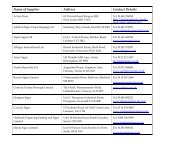titlepage/contents pg 1-16 - British Parking Association
titlepage/contents pg 1-16 - British Parking Association
titlepage/contents pg 1-16 - British Parking Association
Create successful ePaper yourself
Turn your PDF publications into a flip-book with our unique Google optimized e-Paper software.
Funding and the <strong>Parking</strong> Business Plan 157presented alongside the case foraltering charges. The setting ofcharges is often a pragmaticpolitical decision rather than onebased on objective analysis ofthe impacts and effects. <strong>Parking</strong>professionals within the authorityshould make it clear to electedmembers when such decisionsundermine or run counter toadopted polices and objectives.There may be ways of avoidingor minimising the risks involvedin taking decisions about parkingcharges that provoke a publicoutcry, for example by:●●Publishing the charges in apolitically “neutral” month (ie,away from elections orChristmas);Agreeing charges coveringmore than one year at a time;and● Agreeing that charges at costof living plus, say, amaximum of 5% can belevied without consultation.The issue of setting charges forresidents’ parking permits iscovered in Chapter 7.Additional revenueCar park operators, both privateand public, can generaterevenue from their car parksadditional to that generated byparking charges, for examplethrough:● Contract parking (generallyprovided on an annual basiswith defined marked outspaces). A variation of this isthe provision, generally inCity Centres, for evening andweekend special rates forlocal residents who do nothave their own spaces;● Advertising on reverse ofparking tickets (both payand-displayand barriersystems);● Internally illuminatedadvertising, which providesincome as well as improvedillumination;● Use of space for Sundaymarkets or car boot sales (Itshould be noted thatplanning permissions arenecessary for regular usage);● Car valeting. This alsoprovides a presence ofpeople that can add to thefeeling of security andpossiblyreducemaintenance and securitycosts;● Vending machines; and●Sponsorship, although thisseems to be rarely tried.Expenditure andOperating CostsOn-streetRevenues should cover thecosts involved in setting up,operating and maintainingparking control schemes. Costsshould at a minimum include thefollowing:● Scheme development;● Consultation;● Information and marketing;● Scheme monitoring andreview;● Day-to-day operating costs,including the issue ofpermits, collection of payand-displaycash, ITservices, “back office” staff, aproportion of seniormanagement costs,contracted traffic wardens orparking attendants; and● Maintenance and equipment,signs and road markings.The use of any surplus revenueswill need to be carefullyconsidered and justified in thebusiness plan.Section 55 of the Road TrafficRegulation Act 1984 restrictsexpenditure of surplus on-streetparking income to making goodany charges against anauthority’s general fund,provision and maintenance ofoff-street parking, highwayimprovements and publictransport schemes. This hasbeen updated by section 95 ofthe Traffic Management Act 2004to allow local environmentalschemes to be added to the listof permissible uses for parkingsurpluses. Regulations underthis Act will also enable highperforming Authorities to have







